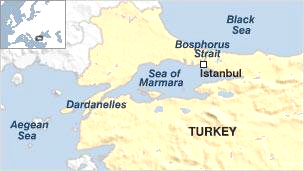Montreux Convention | 03 Mar 2022
For Prelims: Montreux Convention, Location of Black Sea, Bosporus and Dardanelles straits.
For Mains: Russia's War over Ukraine, Effect of Policies & Politics of Countries on India's Interests.
Why in News?
Turkey is set to activate the Montreux Convention in response to Russia's War over Ukraine.
- The declaration that situation in Ukraine had become a war, authorizes Turkey to activate the Montreux Convention and ban Russian war vessels from entering the Black Sea through the Bosporus and Dardanelles straits.
What is the Location of the Bosporus and Dardanelles straits?
- The Bosporus and Dardanelles straits, also known as the Turkish Straits or the Black Sea Straits, connect the Aegean Sea and the Black Sea via the Sea of Marmara.
- It is the only passage through which the Black Sea ports can access the Mediterranean and beyond.
- Over three million barrels of oil, about 3% of the daily global supply, mostly produced in Russia, Azerbaijan, and Kazakhstan, pass through this waterway every day.
- The route also ships large amounts of iron, steel, and agricultural products from the Black Sea coast to Europe and the rest of the world.
What is the Montreux Convention?
- The international agreement was signed by Australia, Bulgaria, France, Greece, Japan, Romania, Yugoslavia, the United Kingdom, the Soviet Union and Turkey and has been in effect since November 1936.
- The Montreux Convention Regarding the Regime of the Straits gives Turkey control over the water route between the Black Sea.
- Russia has a major navy base at Sevastopol, on the Crimean Peninsula.
- However, for ships to move to and from the Mediterranean – and beyond – they have to pass through two straits controlled by Turkey under the Montreux Convention.
- It sets limits on the passage of civilian vessels and military warships through the Dardanelles and the Bosporus straits. The key elements in the Montreux Convention are:
- In the event of a war, the pact gives Turkey the right to regulate the transit of naval warships and to block the straits to warships belonging to the countries involved in the conflict.
- Any country with coastline on the Black Sea – Romania, Bulgaria, Georgia, Russia or Ukraine – must notify Turkey eight days in advance of its intention to send vessels of war through the straits.
- Other countries, the ones that don’t border the Black Sea, must give Turkey 15 days’ advance notice.
- Turkey has used the convention’s powers before. During World War II, Turkey prevented the Axis powers from sending their warships to attack the Soviet Union – and blocked the Soviet navy from participating in combat in the Mediterranean.
What is the Role of Turkey in the Present Crisis?
- In the current situation, the Turkish government finds itself in a difficult position, as both Ukraine and Russia are important partners in critical energy and military trade agreements.
- Turkey, a NATO member since 1952, wants to strengthen its ties with the West while not upsetting Russia. Its control over these key straits may test its balancing act.
- In this context, Turkey has held that it cannot block all Russian warships accessing the Black Sea due to a clause in the pact exempting those returning to their registered base.
- Article 19 of the treaty contains an exception for the countries on the Black Sea that can effectively undermine Turkey’s power in blocking the Russian warships entering or exiting the Black Sea.
- Vessels of war belonging to belligerent powers, whether they are Black Sea Powers or not, which have become separated from their bases, may return thereto.
- This exception provides Russia with an alternate way to exploit the Montreux Convention, which would be to reassign some of its vessels to the Black Sea.

